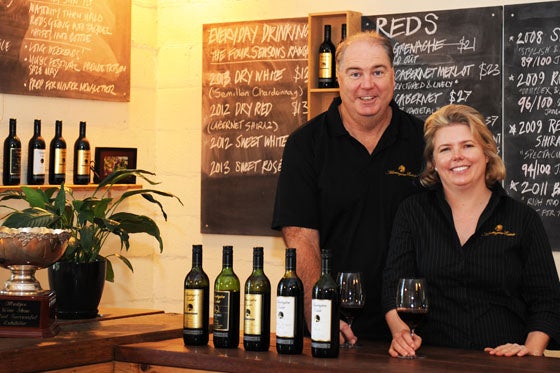Posted by on
19/05/2021
Whilst steeped in history, Huntington Estate is being set up for a sustainable future under the considered custodianship of Tim and Nicky Stevens – who hold a vision for their renowned Mudgee vineyard and winery we can all raise our glass to.
The foundations of the business strategy are as tried and tested as the vines themselves, planted over 50 years ago by founder Bob Roberts.
Tim and Nicky are fully committed to building on the traditions and exceptional quality Huntington is famous for, while investing in a more sustainable future, to ensure Huntington continues to thrive over the next 50 years and beyond.
“Our goal is to continue to strengthen the business in a responsible and sustainable way. We aim to be carbon neutral by 2030, to take all measures to adapt to the changing climate, to minimise our use of scarce resources, and to nurture our soils and vines.”
Many of the initiatives undertaken to date have proven to be cash positive within the first year, and with short payback times.
“We have invested significantly in renewable energy in the past three years, with a 28kw solar pumping system replacing a diesel generator to more efficiently power our bore-fed irrigation system.”
With a better than forecast 22 month payback, Nicky said the cost savings going forward would be significant.
The 400 tonne winery and cellar door are also both now fully powered by an 87kw solar system, with excess power fed back into the grid.
Repayments, Nicky said, were much cheaper than their previous power bills, and once the installation has been paid off, they will invest in batteries to be fully self-sufficient.
The couple has also been mindful to replace older, ‘dirty’ machinery – with old refrigeration units and tractors replaced by cleaner, newer and more efficient machines.
“By taking stock of our infrastructure – and looking at how we can more efficiently run machinery and reduce emissions – we’ve been able to reduce our individual footprint enormously, and in many cases all whilst saving money and boosting productivity, which is a real no-brainer.”
“We’ve taken full advantage of the current Instant Asset Write-offs and low interest rates to invest in our future,” she said.

The operation is taking stock below the soil also, committed to improving the carbon storage in the soil through increasing the diversity of cover crops planted inter-row between the vines.
“For the past three years we’ve planted mid-row cover crops consisting of a mix of legumes, cereals and root vegetables, well fertilised and boosted with probiotics to improve soil chemistry and biology, to add organic matter, improve water infiltration and fight soil compaction.”
These cover crops, she said, also out-competed weeds, reducing the overall chemical usage on the property.
Tree planting and wilderness zones in the vineyard, populated by flowers and vegetables to attract beneficial insects also encouraged diversity.
The Stevenses also pivoted part of their production in the wake of recent drought impacts, replacing parts of the vineyard with drought and heat tolerant varieties, such as Grenache, to help mitigate Australia’s harsh climatic challenges.
“The move to Grenache has so far proved extremely successful. Customers love it, and the vines are so happy in the heat and drought that we have had to fruit-thin to prevent over-cropping – who would have thought!” she smiled.
Grape sunscreen, foliar fertilisation and fertigation are just some of the other new technologies being adopted to mitigate the heat and drought, with exciting results.
“There is a massive amount of experimentation and innovation in the industry, and a wonderful culture of sharing best practice and experience that is helping us all to succeed.”
The vineyards are also constantly being renewed to ensure a healthier balance of old, low yielding vines, such as those over 50 years, with younger more vigorous vines for ongoing succession within the vineyard.
Nicky said key water savings were also being made through increased water-use efficiency, with moisture probes utilised to gather meaningful data on how much water is needed – and how and when it is best delivered.
“Water is critical and we’ve made positive gains in the vineyard with usage, and our next focus is on water consumption, capture and reuse in the winery.”
And here’s cheers to that.
